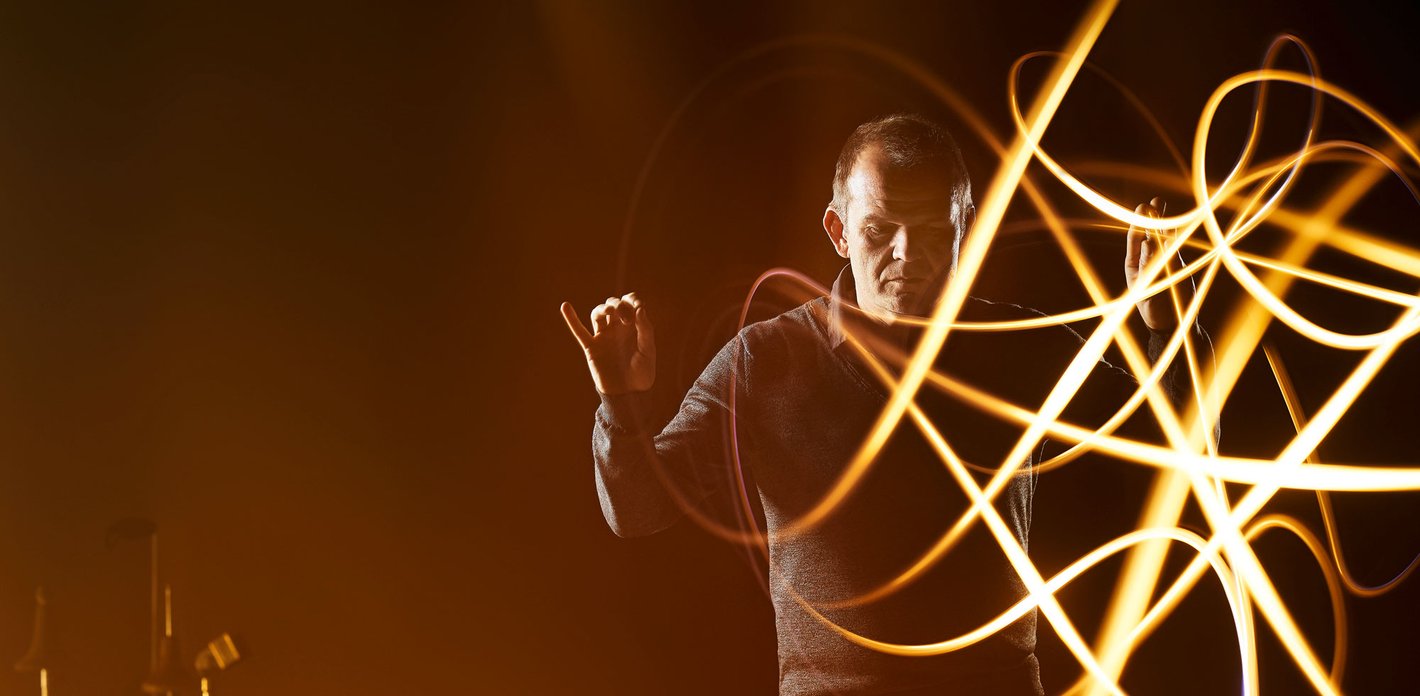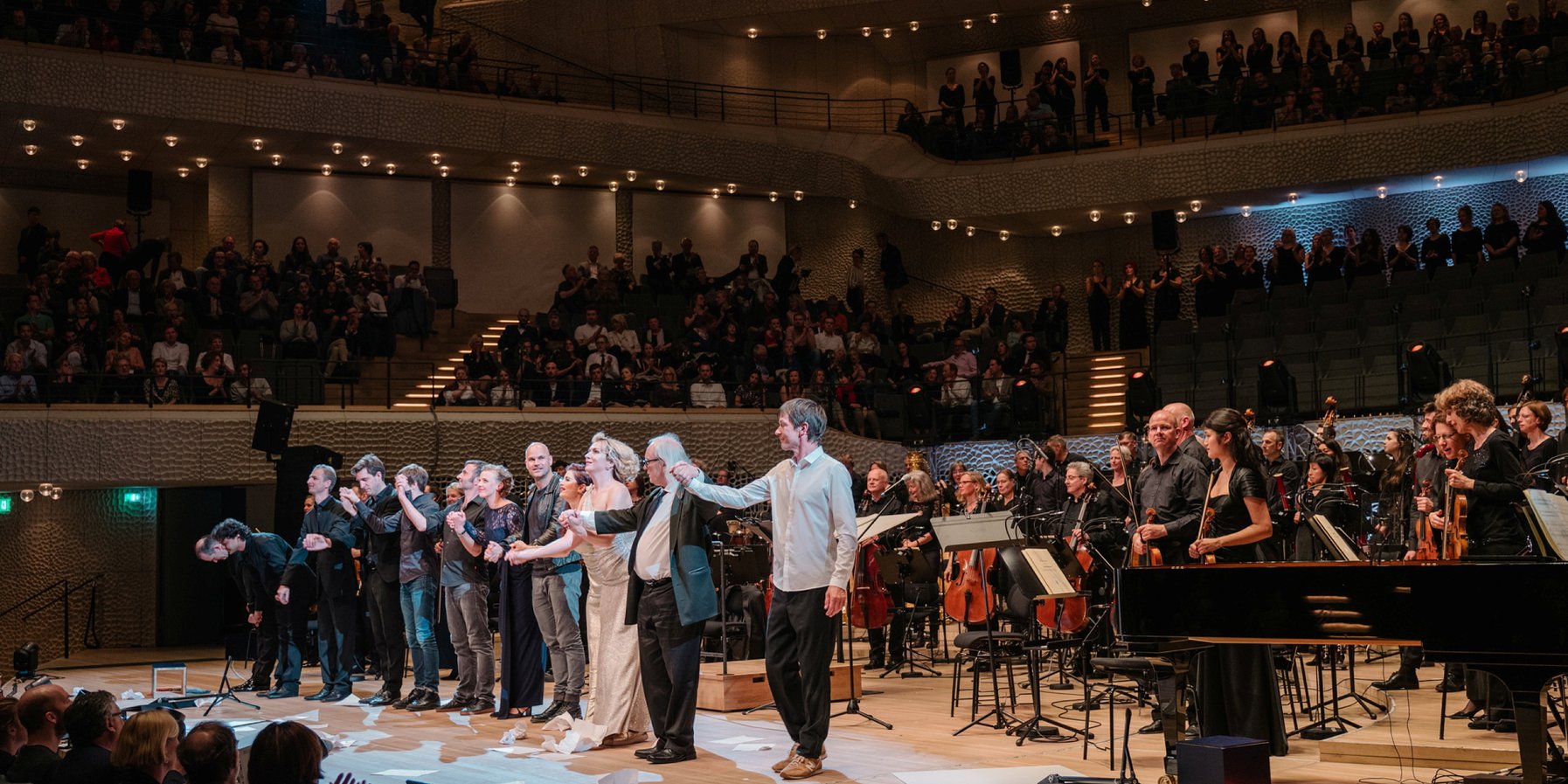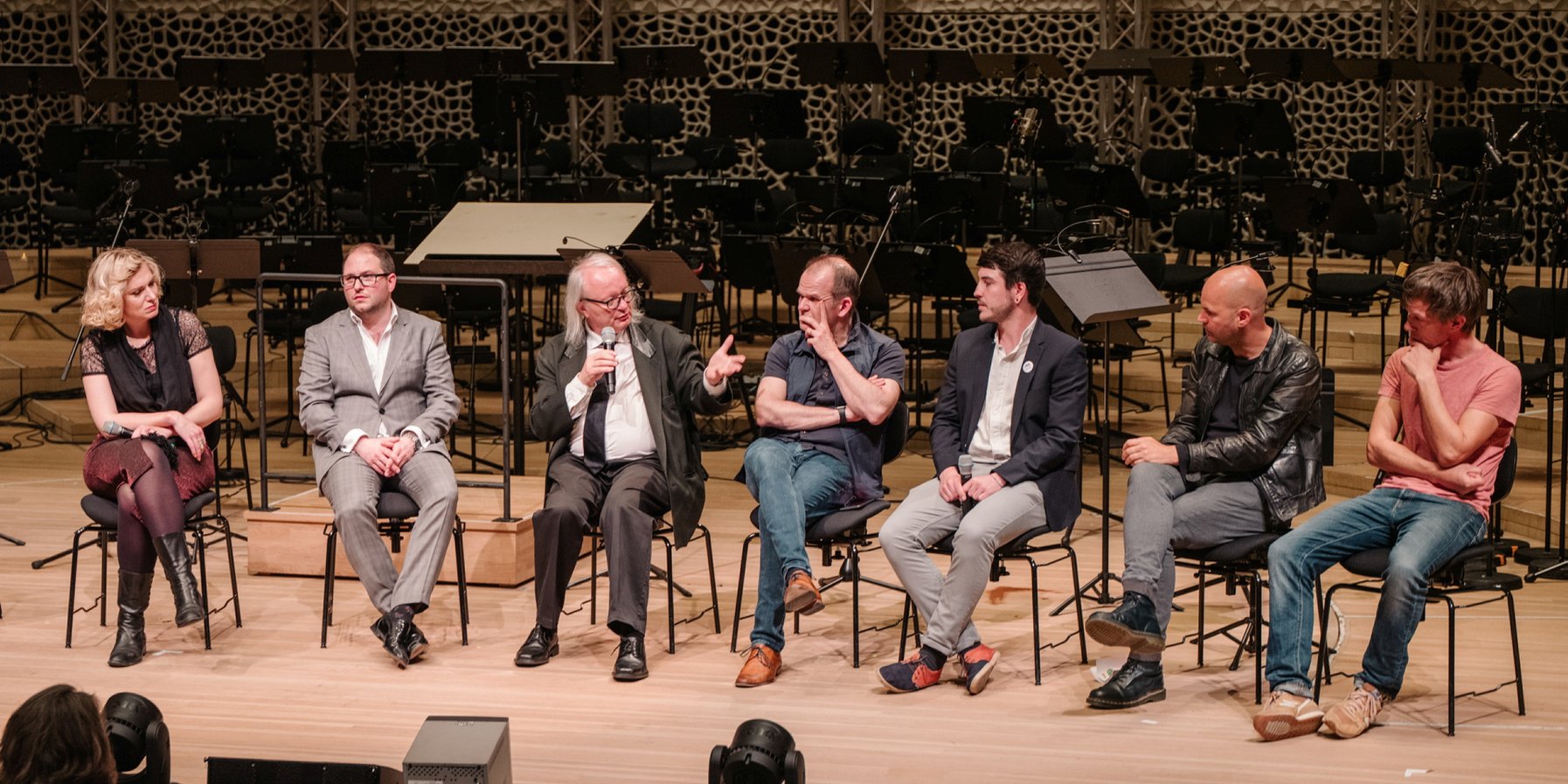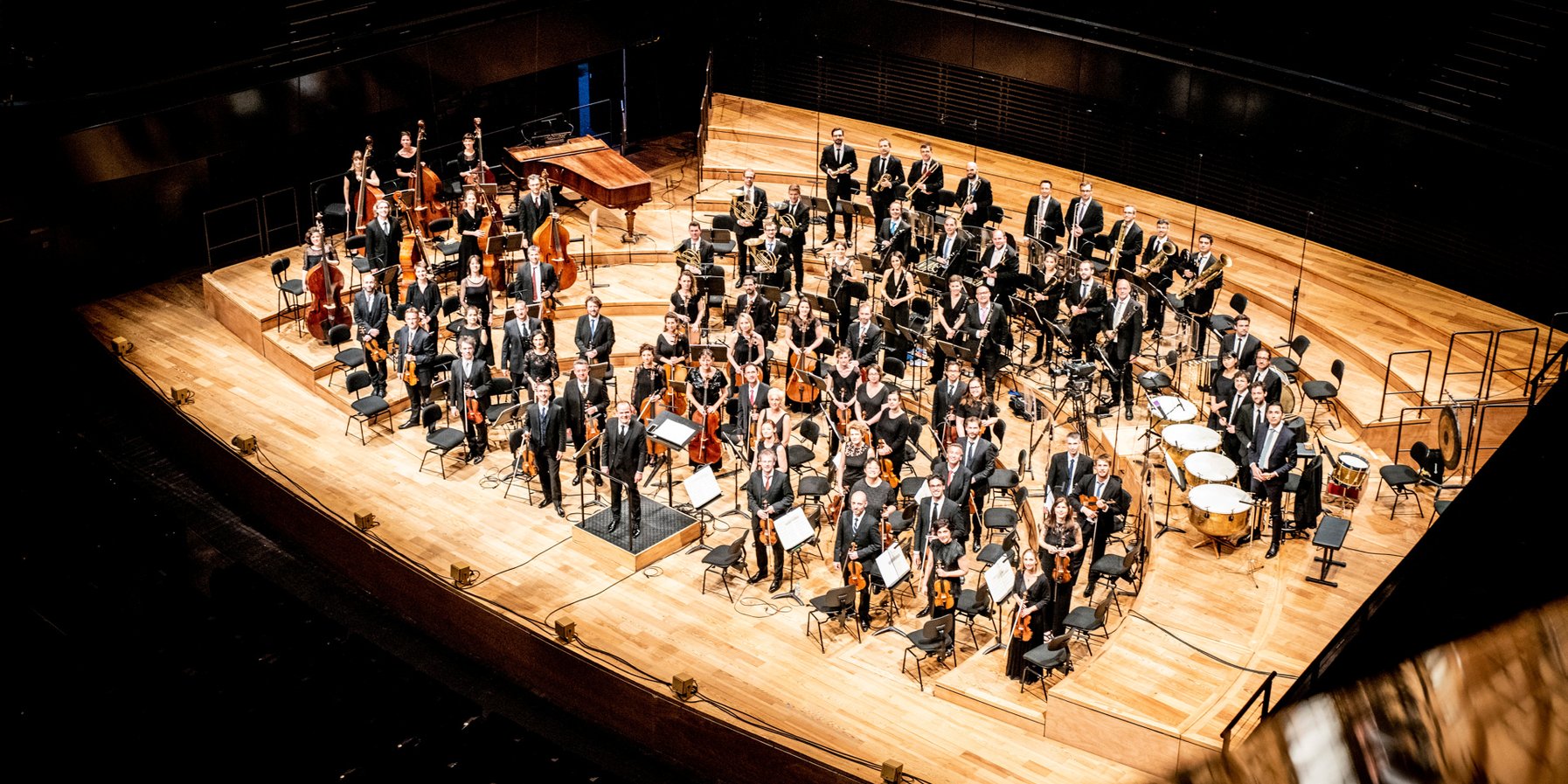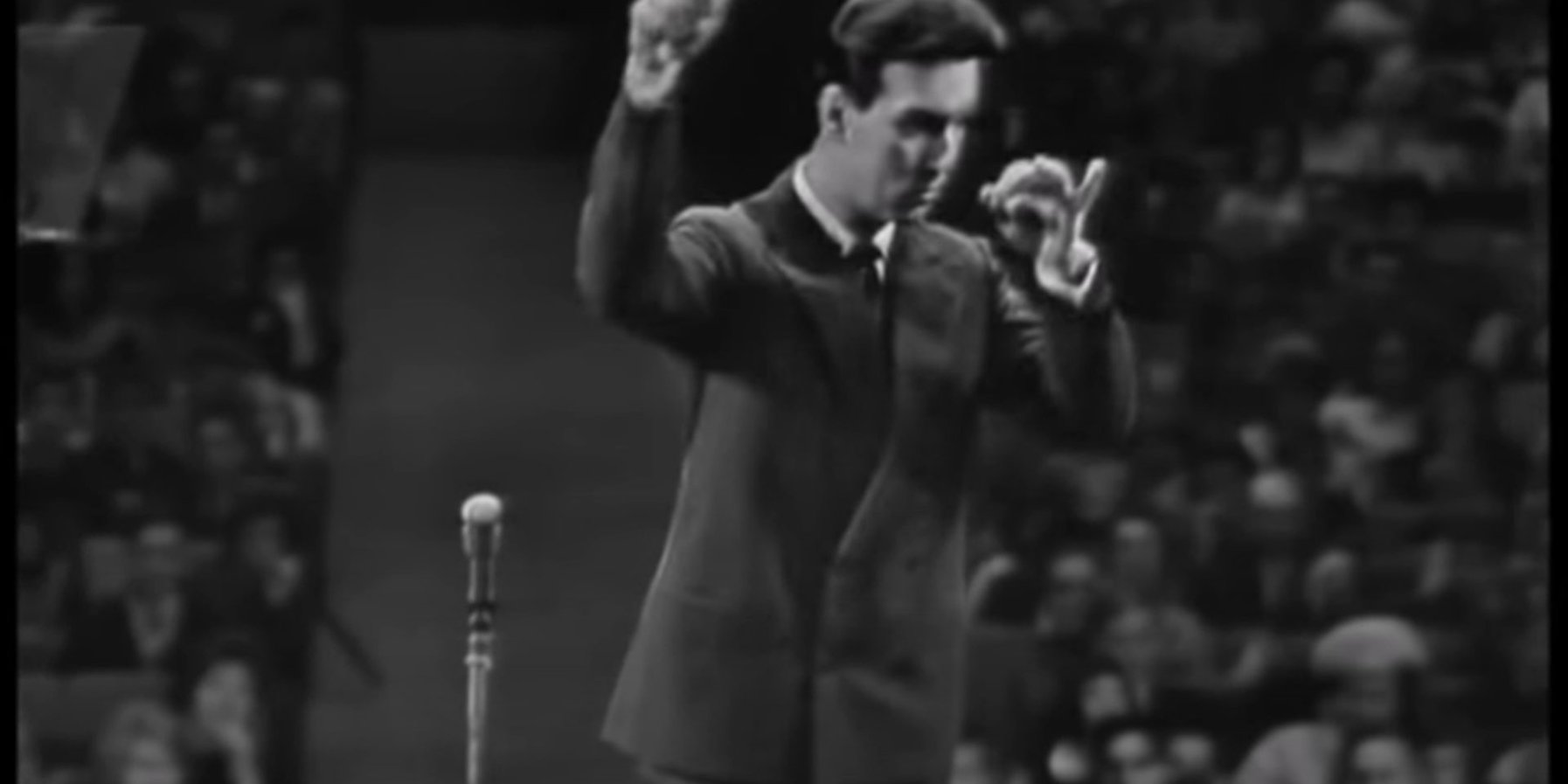He is the great all-rounder among today's conductors, as much as home in Baroque and Classical music as he is in the Romantic core repertoire –and especially in contemporary music. His range is also reflected in his programme for the Cologne Gürzenich Orchester, whose GMD he has been since 2015. Contemporary works and first performances are a fixed component, e.g. his intense cooperation with Philippe Manoury as »composer for Cologne«. In the 2018/19 season, Roth conducted the first performance of Manoury's full-length »Lab. Oratorium«, which highlights refugees' suffering, and which he subsequently put on with overwhelming success in the Elbphilharmonie.
The public follows Roth precisely because he confronts audiences with cleverly-planned and challenging programmes featuring, it goes without saying, a fair share of contemporary works. Roth himself puts it like this: »My ideal programme is one where the audience has new experiences – regardless of whether they are listening to Mozart or present-day works.« It was this aim that prompted the French conductor, who was born in 1971, to found his orchestra Les Siècles in 2003, with which he performs music from a wide variety of periods – but always on instruments and in the style of the era when the work was written. Roth is fond of referring to his ensemble as a »chameleon« whose members sometimes play on as many as three sets of instruments in one concert. Authentic period sound on demand, as it were.
François-Xavier Roth demonstrates his impressive versatility in the 2023/24 season at the Elbphilharmonie, which is devoting a special spotlight to him consisting of three concerts: under his baton, Les Siècles with violinist Isabelle Faust and pianist Alexander Melnikov bring together two composers who don't have much in common at first glance: the effervescent Mozart, and modern visionary György Ligeti. In the last concert, he conducts Bernd Alois Zimmermann's opera »Die Soldaten«, written for a huge ensemble, in a production by Calixto Bieito.
Interview
Monsieur Roth, you are fond of unusual concert programmes that pose quite a challenge for the audience. What are you trying to achieve?
I am convinced that we can also reach people with programmes generally regarded as difficult – provided the programme is well thought-out. There is a widespread trend nowadays towards simplification; people feel that nothing should be complicated, that everything should have as low a threshold as possible, including music. I see that as a dangerous development. We need to stretch ourselves mentally so that our mind can evolve its full potential. And I firmly believe that people want to be challenged if it's worth their while.
Where does your marked interest in such a wide-ranging repertoire stem from?
A lot of people connect my name with contemporary music. Personally, I see myself as a musician who likes contemporary music from every era. I am always interested in what 's fresh and new. That is the way I look at music, irrespective of whether I'm conducting a contemporary composer like Helmut Lachenmann or Baroque music by Rameau: I ask myself what is new and innovative, what the composer is saying in the context of his time – never mind whether that time is today, yesterday or the day before yesterday. But I shouldn't fail to mention something else that is much more banal: I conduct the music that I love. It was never my plan to become some kind of »universal« conductor: there was no strategy to the way my career evolved.
Don't you make your work harder that way? Take a conductor like Christian Thielemann, who feels entirely comfortable with Bruckner, Wagner and Strauss and has their works at his fingertips. Whereas you have to start pretty much at zero every time.
That's a question of balance, and every conductor finds his own way to keep the music fresh and make sure he continues to enjoy it. I'm planning to conduct Bach and Rameau one week, and György Ligeti and Pierre Boulez the next. For me, that's the ideal way to go, but that's my own personal decision. A decision that also deepens my understanding of music. When I conduct Schumann for instance, whose music has a lot to do with flow, then I understand Wagner better, who in turn forges a link with Richard Strauss. And Strauss in turn leads me to Ligeti.
It sounds as if you're not fond of routine.
Absolutely not! I'm not interested in repeating the same repertoire time after time. Routine cripples creativity. I could simply conduct ten programmes a year and leave it at that, but that wouldn't satisfy me. By jumping to and fro from one century to another, I maintain a fresh approach to the music and its essence. Leonard Bernstein did it this way too: even if he had already conducted a work a hundred times, he bought himself a new copy of the score every time, to avoid reading his old notes. He wanted to rethink the music every time!
What does that mean for the orchestra you are working with? In Hamburg, for example, you performed a programme of dance music from four centuries with Les Siècles.
That obviously won't work with every orchestra. I would actually say that Les Siècles is the only orchestra it works with. It's like a chameleon, selecting the right instruments and the right colours and style for each era. For this concert the musicians have three different sets of instruments, which supplies a different sound in each case. When we started this, it was an experiment, and we had no idea if it would work. But in the end we got through to the audience: it worked after all. It goes without saying that it's a challenge for the musicians, who have to adopt a different role every time, like an actor. But this way, we enable the audience to enjoy different listening experiences. We aren't interested in putting on a spectacle, but simply in giving people the chance to experience music on a deeper level.
Les Siècles sees flexibility as its declared aim. How do things look amongst the traditional ensembles? Do today's orchestras need to be more flexible per se?
Definitely! For a whole time, this was the preserve of orchestras dedicated to historic performing practice and the contemporary-music ensembles, the so-called specialists. But Les Siècles is not a specialist ensemble. Or to look at it another way: we are specialists for every kind of music. This is a tendency I see more and more often: it's no longer as much about specialising in one period, but about moving through the entire repertoire with a sure sense of style. Nowadays I notice many orchestras playing contemporary music as a matter of course, where it was something of a taboo in the past. But at the same time they are also playing more Haydn and Bach: it's truly enriching to have the while horizon in front of you instead of always just looking out of one small window. One good example is the Mahler Chamber Orchestra, which is at home in so many different styles. They play Mozart just as well as Romantic or contemporary music. In one of our Hamburg concerts we are performing pieces by Haydn, Martinů and Ligeti.

»I'm not interested in repeating the same repertoire time after time. Routine cripples creativity.«
The Cologne Gürzenich Orchestra needs a different kind of flexibility: it's not confined to the concert platform, but is first and foremost the city's opera orchestra. What does that mean for the musicians?
They need to react! E.g. to a singer on stage. They need to follow his breathing and tempo, while paying attention to the details of the production at the same time. Opera orchestras are known for this special flexibility.
Is there actually a reason why you conduct without a baton? Your colleague Christoph Eschenbach regards the baton as a »precision tool«, while Colin Davis once said that the baton is like a fishing rod that you can use to fish for sounds in the orchestra. Makes the baton sound like a pretty useful piece of equipment…
I'm not the only person to do without a baton: Pierre Boulez didn't use a baton either. It's a personal decision, of course – and in my case a practical one as well. I started out conducting with a baton, but I regularly lost my grasp and sent it flying through the air, which was a bit embarrassing. Then I simply abandoned it, and found that things work perfectly well without a baton. Voilà! It's true that there is a serious musical background too, which has to do with the different kinds of conductor. Some of them conduct with great precision, which requires the musician to focus carefully on the baton. I'm a different type of conductor. It goes without saying that I need to have the musicians' attention as well, but I don't have to conduct every bar meticulously. I prefer to make sure that all the members of the orchestra are in touch with one another – and that I don't need a baton for that. This connection is important to me: when it works, it creates freedom for the musicians as well. If you watch recordings of Claudio Abbado, for example, you can see that his conducting had much more to do with listening than with the expectation that the musicians would follow his baton unconditionally.
Claudio Abbado conducts the New York Philharmonic (1963)
Does your decision to do without a baton reveal something about your relationship with the musicians? The conductor's baton can be seen as a symbol of control, like a king's sceptre.
The conductor's role is a special one. After all, he stands in front of the orchestra to direct it. And that is obviously a matter of authority and respect. The way a conductor deals with that is in turn a question of personality and ego. I know colleagues who prefer not to have any contact without their musicians beyond the concert platform. That has nothing to do with them being authoritarian or aloof. It just works better for them if they set a clear boundary. I'm different: I like to be in touch and communicate. I expect a lot from the musicians too. We can only get through to the audience and make them enthusiastic about music if every member of the orchestra gives his or her best: not 100, but 200 per cent!

»I don't need to conduct every bar meticulously. I prefer to make sure that all the members of the orchestra are in touch with one another.«
And what do you do on an occasion when you can't achieve 200 per cent?
That's a major part of my work as a conductor: I need to get the musicians on board and convince them. You can sometimes do that with just a handful of words in a rehearsal, if you utter them at the right moment. That can serve as a first step to releasing a huge amount from energy that is then conveyed to the audience.
Interview: Bjørn Woll
This interview appeared in the Elbphilharmonie Magazin (1/20)
